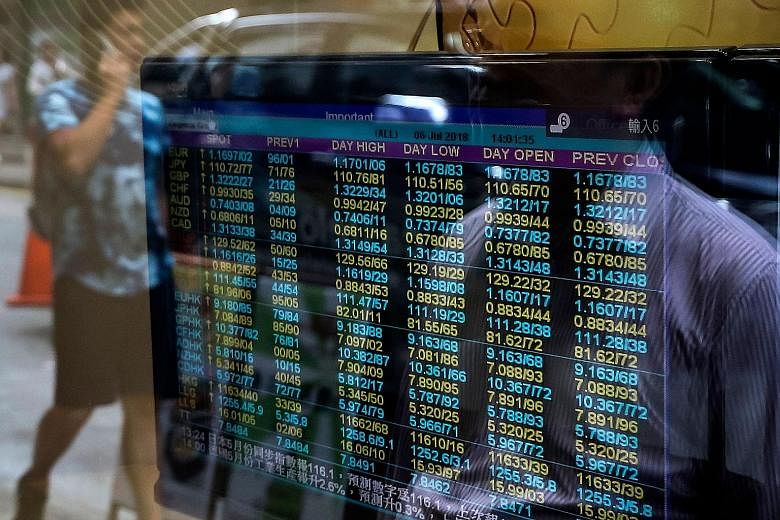HONG KONG • The United States might be the trigger for escalating trade tensions with China, but its currency could still be the best place for global investors to find safety as the dispute came to a fresh crossroads yesterday with tariff increases taking effect.
That's because the conflict is unfolding alongside what could be an even more powerful dynamic: US monetary policy normalisation.
An appreciating dollar, propelled by expectations for stepped-up Federal Reserve tightening, has hammered markets since April, when benchmark 10-year Treasury yields first pricked through 3 per cent. That has left some traditional havens - such as gold - less of a buy, while offering pockets of value - such as Australian equities - in areas investors might not typically have considered.
The ultimate refuge, investors and strategists say, is the greenback. Dollar-based money market funds are now offering rates of about 2 per cent, a level above the yield on seven-year Treasuries as recently as last September.
"The US dollar is now the most popular safe-haven asset," said Ms Fan Cheuk Wan, head of investment strategy for Asia at HSBC Private Bank. For a premium, the bank is recommending dollar-denominated emerging market debt, where yields have climbed in response to Fed tightening.
Gold, a haven for millennia in times of turmoil, hasn't been so hot the past three months, falling more than 5 per cent. Japan's yen, often a safe harbour, thanks to the country's status as the world's biggest net creditor, has dropped almost 3 per cent in that period.
Switzerland's franc, another favourite for the cautious, is also down 3 per cent.
Behind the declines of all three has been the appreciation of the dollar, up more than 4 per cent as measured by the Bloomberg Dollar Spot Index.
The acceleration in Fed normalisation also played a role in the declines, with the US central bank rolling off US$40 billion (S$54 billion) of its bond holdings a month at the current pace, and anticipating another half-point in rate hikes this year. While the monetary policy outlook has implications for Treasuries, they are still seen by some as a buffer if global equities get roiled by fears that a trade war will damage global growth.
"They are a safe haven even when shocks come from the United States," Mr Patrick Artus, chief economist at Natixis Securities, wrote of US government securities in a note this week.
"Investors should expect volatility to continue," said Mr Mark Haefele, chief investment officer at UBS Global Wealth Management. "We recommend investors stay invested, but consider five actions: looking to alternatives, hedging equity exposure, improving credit quality, diversifying sector and country risks, and taking a longer-term view."
The other main combatant in the trade dispute has seen its own government bonds rally this year - in part thanks to moves by the People's Bank of China to support liquidity in an effort to prevent a deeper hit to economic growth.
Mr Shaniel Ramjee, a senior investment manager at Pictet Asset Management in London, recommends yuan-denominated Chinese government bonds.
BLOOMBERG

